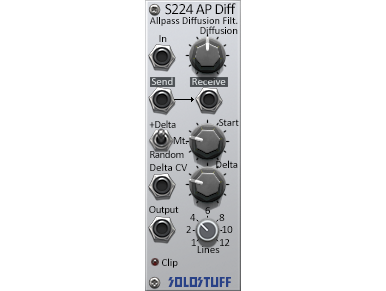Product Description
(This module is included in the System B)
A typical allpass filter is usually used for phase shifting. But a diffusion allpass filter is a bit different. The main purpose of this filter is to diffuse, spread or dissolve the signal it receives over a longer period of time while having a flat frequency response. Manfred Shroeder developed this method in 1962 when he was doing research on artificial reverberation. The main objective was to dissolve the reflections of short delays after some time similar to what happens in real room reverb. This is usually called “Echo Dencity”. Many modern DSP reverbs use such filter to control the diffusion level.
The S224 puts 12 diffusion filters connected in series under one macro control panel. The number of filters used can be chosen using the lines knob. There are 3 modes of operation that can be chosen with a switch.
+Delta mode, the first filter in the series has start time for it’s delay line. The 2nd filter has start+delta. The 3rd has start+2delta. The 4th has start+3delta and so on*
Mt (Metalic) mode is exactly like +Delta but with a rather harsher method of calculation which will keep the high resonations.
Random mode, the first filter has start time for it’s delay line. The 2nd filter has the 1st filter time + R2 X Delta. The 3rd has the 2nd filter time + R3 X Delta. The 4th has the 3rd filter time + R4 X Delta and so on. Where R2, R3, R4…. are all random numbers between 0 and 1.
The start time can range from 0 to 100ms. While delta ranges from 0 to 40ms. The diffusion knob changes the amount of diffusion wanted, at minimum it will simply give the input signal. While at max it will act like a short delay. The interesting results happens in between.
The S224 also provides insert effect jacks for the internal feedback loop of the last filter used in the series**. This is useful for nesting multiple S224 modules inside each other to achieve one of Shroeder’s good designs. This can give good to wild results for designing reverbs of your own. Of-course any effect or modules chain can be patched here. But use caution as this is a feedback loop, so it can overload/clip if the chain is amplifying.
Fore more information regarding diffusion all pass filters, check gDSP Allpass filter, and Reverbs: Diffusion, allpass delays, and metallic artifacts.
*Using prime times is a well known method to avoid metallic sounds. But it’s of little use here since the design it self entails modulating times.
**This is not the 12th filter. But the last filter being used. So if you set the the lines to say 8. The 8th filter will use the insert effect.


Reviews
There are no reviews yet.